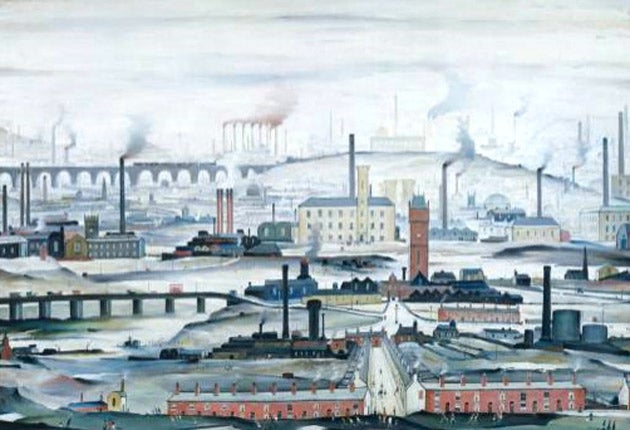David Lister: The Tate shouldn't shun Lowry just because it doesn't rate him
The Week in Arts

Poor old Lowry. It was pointed out this week that Tate Britain, the gallery that tells the story of British art, has 23 paintings by the artist and has only ever displayed one of them – briefly.
Sir Ian McKellen is spearheading a campaign to have Lowry displayed properly in the gallery. He says: "It is a shame verging on the iniquitous that foreign visitors to London shouldn't have access to the painter English people like more than most others."
It does seem that Tate Britain should be renamed Tate Southern Britain. The Mancunian Lowry is getting unreasonably short shrift. His famous paintings of "matchstalk" men and women and his urban landscapes did, in the opinion of many who are not Tate curators, offer a glimpse of northern industrial society which could be poignant and humorous, grim and primitive yet beautiful.
Besides, how much convincing does the Tate need? It must presumably be aware that there is a whole museum named after Lowry in Salford. My own canvassing of opinions from leading figures in the art world found a view that Lowry was a good artist but perhaps a "one note artist" and besides, he was an outsider – not just a northerner (though some felt this was even now not an insignificant factor where the art establishment is concerned) but more importantly that he doesn't really fit in to the "story" of British art that Tate Britain's curators like to tell, one room leading on from another.
Whatever the reason, I take exception to the Tate deciding to exclude Lowry, because it goes against what I believe is Tate Britain's role as our national gallery of British art. It does not just exist to present a particular narrative of British art. It should exist to present British art's undoubted masters, its celebrated figures, its eccentrics and its controversialists.
For at the root of this is the question of what we should expect from our national and nationally subsidised institutions. Similar questions have been asked in the past of the National Theatre, which for example excluded the celebrated British playwright Terence Rattigan from its stages for years, even decades, highly ironic as it is now in the forefront of lauding him in his centenary year.
Meanwhile, it looks as if the Tate will take some convincing. Tate curator Chris Stephens was quoted this week as saying: "What makes Lowry so popular is the same thing which stops him being the subject of serious critical attention. What attracts so many is a sort of sentimentality about him. He's a victim of his own fan base." An official spokesman later said the Tate expects to display at least one Lowry painting after work on new galleries is completed in 2013.
What – a whole one! Tate Britain should welcome this great outsider back in. Give him his own room or his own exhibition. By all means start a debate and by all means let the Tate's curators say publicly what their misgivings about Lowry are. Then let the public have its say. Keeping him in the basement benefits neither the public nor the study of art history. It's a dereliction of duty.
'Self-deprecation', Wendy? Hardly
The British Library has bought for £32,000 the collected archives of the poet Wendy Cope. The clamour for her collected archives to be preserved for the nation has not been deafening, and there was a time, though it seems fairly long ago, when people left their papers to the nation gratis. Nevertheless, one must acknowledge that Ms Cope is not giving her archive to a higher bidder in America – if indeed there is one.
The British Library says it has received from Ms Cope "15 large storage boxes", notebooks and drafts of poems, 40,000 emails and material relating to her early life. There are letters, including a congratulatory one from Ted Hughes. There are even school reports, including one when she was four in which her English teacher noted: "Wendy's ability to penetrate to the heart of a question is of great value." Also included are references she was given when she went for teaching jobs, noting her "sympathetic approach" and "keen sense of humour".
Perhaps somewhere in those 15 large storage boxes are some truly rotten school reports and the odd poor reference. I hope so. It would certainly demonstrate that "keen sense of humour" if there were an element of self-deprecation in the archive.
A Booker Prize that patronises Beryl
The late author Beryl Bainbridge was shortlisted for the Booker Prize five times, but never won it. So, following her death, the Booker organisers announced a public vote on which of her books was most Booker worthy. Now they have announced the winner, the novel Master Georgie, calling the award the Man Booker Best of Beryl.
When I met Beryl Bainbridge, I found her, as everyone did, a delightfully direct, straight-talking, no-nonsense woman. I do wonder whether she would have appreciated this slightly patronising gesture.
If you go for prizes, you either win them or don't win them. It's already tribute enough to be shortlisted five times. There was no real need for an artificial prize which, however you look at it, is still not the Booker.
Join our commenting forum
Join thought-provoking conversations, follow other Independent readers and see their replies
Comments
Bookmark popover
Removed from bookmarks